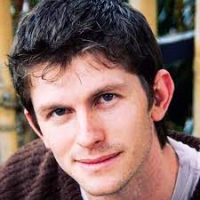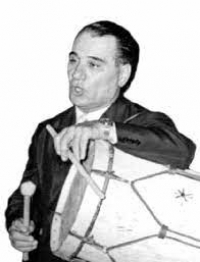Drum Sheet Music
 ".. you've got to be original, or there will be nothing distinctive or interesting about your playing" Liona Boyd - Classical Guitarist
".. you've got to be original, or there will be nothing distinctive or interesting about your playing" Liona Boyd - Classical Guitarist
Ilio Volante
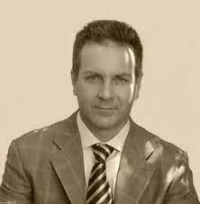
Was born in Italy in 1964, he was still a teen ager when he started his music studies (saxophone) showing from the very beginning a particular predisposition towards the music composition and Jazz music. At the age of 19 he won the audition for the Italian National Army Band stationed in Rome. He served it for 10 years under the direction of Col. Marino BARTOLONI. After this, he played in the Grenadiers of Sardinia’s Band (Rome) and the Shape International Band (the official Nato Band) stationed in Mons (BELGIUM). In this last post, he covered for three years the 1st Tenor Saxophone slot helping the Director, MSg Allen WITTIG, in doing the original arrangements for the Big Band. http://www.iliovolante.com http://www.musicaperbanda.com
George Harrison
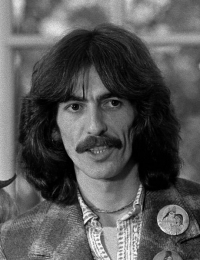
George Harrison, MBE (25 February 1943 – 29 November 2001) was an English rock guitarist, singer-songwriter and film producer who achieved international fame as lead guitarist in The Beatles. Often referred to as "the quiet Beatle", Harrison embraced Indian mysticism, and helped broaden the horizons of the other Beatles, as well as those of their Western audience. Following the band's breakup, he had a successful career as a solo artist and later as part of the Traveling Wilburys, and also as a film and record producer. Harrison is listed number 21 in Rolling Stone magazine's list of "The 100 Best Guitarists of All Time".
Although most of The Beatles' songs were written by Lennon and McCartney, Harrison generally wrote one song per side from the Help! album onwards. His later compositions with The Beatles include "Here Comes the Sun", "Something", "I Me Mine", "Taxman", "Within You Without You", "Think For Yourself", "If I Needed Someone", "The Inner Light", "Old Brown Shoe", "Piggies", "While My Guitar Gently Weeps" and "Savoy Truffle". By the time of the band's breakup, Harrison had accumulated a backlog of material, which he then released as the acclaimed and successful triple album All Things Must Pass in 1970, from which came two singles: a double A-side single, "My Sweet Lord" backed with "Isn't It a Pity", and "What Is Life". In addition to his solo work, Harrison co-wrote two hits for Ringo Starr, another ex-Beatle, as well as songs for the Traveling Wilburys—the supergroup he formed in 1988 with Bob Dylan, Tom Petty, Jeff Lynne and Roy Orbison.
Harrison embraced Indian culture and Hinduism in the mid 1960s, and helped expand Western awareness of sitar music and of the Hare Krishna movement. With Ravi Shankar he organised a major charity concert with the 1971 Concert for Bangladesh, and is the only Beatle to have published an autobiography, with I Me Mine in 1980.
Besides being a musician, he was also a record producer and co-founder of the production company HandMade Films. In his work as a film producer, he collaborated with people as diverse as Madonna and the members of Monty Python. He was married twice, to the model Pattie Boyd in 1966, and to the record company secretary Olivia Trinidad Arias in 1978, with whom he had one son, Dhani Harrison. He was a close friend of Eric Clapton. Harrison died of lung cancer in 2001.
Although most of The Beatles' songs were written by Lennon and McCartney, Harrison generally wrote one song per side from the Help! album onwards. His later compositions with The Beatles include "Here Comes the Sun", "Something", "I Me Mine", "Taxman", "Within You Without You", "Think For Yourself", "If I Needed Someone", "The Inner Light", "Old Brown Shoe", "Piggies", "While My Guitar Gently Weeps" and "Savoy Truffle". By the time of the band's breakup, Harrison had accumulated a backlog of material, which he then released as the acclaimed and successful triple album All Things Must Pass in 1970, from which came two singles: a double A-side single, "My Sweet Lord" backed with "Isn't It a Pity", and "What Is Life". In addition to his solo work, Harrison co-wrote two hits for Ringo Starr, another ex-Beatle, as well as songs for the Traveling Wilburys—the supergroup he formed in 1988 with Bob Dylan, Tom Petty, Jeff Lynne and Roy Orbison.
Harrison embraced Indian culture and Hinduism in the mid 1960s, and helped expand Western awareness of sitar music and of the Hare Krishna movement. With Ravi Shankar he organised a major charity concert with the 1971 Concert for Bangladesh, and is the only Beatle to have published an autobiography, with I Me Mine in 1980.
Besides being a musician, he was also a record producer and co-founder of the production company HandMade Films. In his work as a film producer, he collaborated with people as diverse as Madonna and the members of Monty Python. He was married twice, to the model Pattie Boyd in 1966, and to the record company secretary Olivia Trinidad Arias in 1978, with whom he had one son, Dhani Harrison. He was a close friend of Eric Clapton. Harrison died of lung cancer in 2001.
Celine Dion

Céline Marie Claudette Dion (born March 30, 1968 in Charlemagne, Quebec) is a Canadian singer, and occasional songwriter and actress.
Dion had first gained international recognition in the 1980s by winning both the 1982 Yamaha World Popular Song Festival and the 1988 Eurovision Song Contest.
Dion's music has been influenced by genres ranging from rock and R&B to gospel and classical, and while her releases have often received mixed critical reception, she is renowned for her technically skilled and powerful vocals.
Dion had first gained international recognition in the 1980s by winning both the 1982 Yamaha World Popular Song Festival and the 1988 Eurovision Song Contest.
Dion's music has been influenced by genres ranging from rock and R&B to gospel and classical, and while her releases have often received mixed critical reception, she is renowned for her technically skilled and powerful vocals.
Andrei Baicoianu

Andrei Baicoianu Arrangeur, Compositeur, Interprete, Editeur Roumanie, PloiestiImprovisation is a musical idea created without premeditation, while rehearsal is vigorous repetition of an idea until it has achieved cohesion. I sometimes add improvisation to a well-rehearsed idea to create a
unique performance.
unique performance.
The North Royalton Community
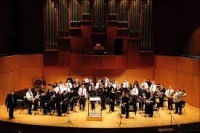
The North Royalton Community Band was founded in 1998 and has grown to become a well-rounded concert organization within a very short time. NRCB performs four to five scheduled concerts each year along with other special event concerts, playing a wide variety of music from marches to overtures, Broadway to Hollywood, classics to contemporary. All of our concerts are free and open to the public.
Richard Hunyaczek
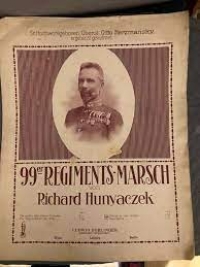
Richard Hunyaczek | Composers ; Born. 26.03.1877 in Budapest ; Died. 22.09.1917 in Wien ; Info. Apart from his thrilling “99th Regimental March”, Richard Hunyaczek ...
Beatles

The Beatles were an English rock band formed in Liverpool in 1960. Their best-known lineup, consisting of John Lennon, Paul McCartney, George Harrison, and Ringo Starr, became the greatest and most influential act of the rock era, introducing more innovations into popular music than any other rock band of the 20th century. Rooted in skiffle and 1950s rock and roll, the Beatles later utilized several genres, ranging from pop ballads to psychedelic rock, often incorporating classical elements in innovative ways. In the early 1960s, their enormous popularity first emerged as "Beatlemania", but as their songwriting grew in sophistication, they came to be perceived by many fans and cultural observers as an embodiment of the ideals shared by the era's sociocultural revolutions.
The band built their reputation playing clubs in Liverpool and Hamburg over a three-year period from 1960. Manager Brian Epstein moulded them into a professional act and producer George Martin enhanced their musical potential. They gained popularity in the United Kingdom after their first modest hit, "Love Me Do", in late 1962. They acquired the nickname the "Fab Four" as Beatlemania grew in Britain over the following year, and by early 1964 they had become international stars, leading the "British Invasion" of the United States pop market. From 1965 on, the Beatles produced what many critics consider their finest material, including the innovative and widely influential albums Rubber Soul (1965), Revolver (1966), Sgt Pepper's Lonely Hearts Club Band (1967), The Beatles (1968), and Abbey Road (1969). After their break-up in 1970, they each enjoyed successful musical careers. Lennon was shot and killed in December 1980, and Harrison died of lung cancer in November 2001. McCartney and Starr remain musically active.
The band built their reputation playing clubs in Liverpool and Hamburg over a three-year period from 1960. Manager Brian Epstein moulded them into a professional act and producer George Martin enhanced their musical potential. They gained popularity in the United Kingdom after their first modest hit, "Love Me Do", in late 1962. They acquired the nickname the "Fab Four" as Beatlemania grew in Britain over the following year, and by early 1964 they had become international stars, leading the "British Invasion" of the United States pop market. From 1965 on, the Beatles produced what many critics consider their finest material, including the innovative and widely influential albums Rubber Soul (1965), Revolver (1966), Sgt Pepper's Lonely Hearts Club Band (1967), The Beatles (1968), and Abbey Road (1969). After their break-up in 1970, they each enjoyed successful musical careers. Lennon was shot and killed in December 1980, and Harrison died of lung cancer in November 2001. McCartney and Starr remain musically active.
Mezzoforte

Mezzoforte is an instrumental jazz-funk fusion band from Iceland, formed in 1977. They signed a record deal with Icelandic label Steinar. Their biggest hit single was "Garden Party", taken from their fourth album Surprise Surprise. It peaked at number 17 in the UK Singles Chart.
Leonard Bernstein
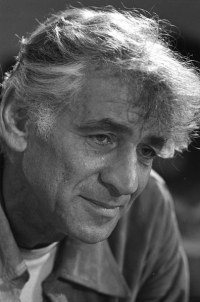
Leonard Bernstein (pronounced /ˈbɜrn.staɪn/, us dict: bûrn′·stīn; August 25, 1918 – October 14, 1990) was an American conductor, composer, author, music lecturer and pianist. He was among the first conductors born and educated in the United States of America to receive worldwide acclaim. He was probably best known to the public as the longtime music director of the New York Philharmonic, for conducting concerts by many of the world's leading orchestras, and for writing the music for West Side Story, Candide, Wonderful Town, and On the Town. Bernstein was the first classical music conductor to make numerous television appearances, perhaps more than any other classical conductor, all between 1954 and 1989. He had a formidable piano technique and as a composer wrote many types of music from Broadway shows to symphonies. According to the New York Times, he was "one of the most prodigally talented and successful musicians in American history."
Msgr. Rudy Villanueva
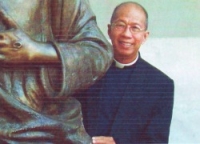
Since Vatican II gave increased importance to music of the local church, Monsignor Rodolfo E. Villanueva, head of Cebu’s Sub-commission on Sacred Music, has been supplying the Vis-Min area with music for the Catholic liturgy. But Cebuanos in general know him simply as Fr. Rudy.
Ordained in 1963, a graduate of Cebu’s San Carlos Major Seminary, he proceeded to Graduate studies in English Literature at Santo Tomas University, and two years after received a scholarship from Serra International, which took him to the State University in Minnesota where he earned a BM in Piano and Master’s in Music Composition. His years as accompanist for the Schola Cantorum at the seminary and for the Pro Musica Antiqua and the composite chorus at University very much shaped his musical interests. Thus, following his studies, he has composed mostly choral and solo vocal music, while coaching quite a few Cebu choral groups. To date, book publications and sound recordings of his music involve singing, while an extended work-in-progress is a theater-piece tentatively called Leon Kilat: A Cebuano Opera.
Ordained in 1963, a graduate of Cebu’s San Carlos Major Seminary, he proceeded to Graduate studies in English Literature at Santo Tomas University, and two years after received a scholarship from Serra International, which took him to the State University in Minnesota where he earned a BM in Piano and Master’s in Music Composition. His years as accompanist for the Schola Cantorum at the seminary and for the Pro Musica Antiqua and the composite chorus at University very much shaped his musical interests. Thus, following his studies, he has composed mostly choral and solo vocal music, while coaching quite a few Cebu choral groups. To date, book publications and sound recordings of his music involve singing, while an extended work-in-progress is a theater-piece tentatively called Leon Kilat: A Cebuano Opera.
Jim Martin
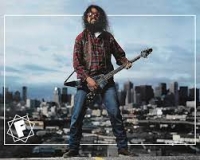
James Blanco Martin known professionally as Big Jim Martin, is an American guitarist best known for his membership in the rock band Faith No More from 1983 to late 1993. Martin also played guitar with the groups EZ-Street, Vicious Hatred, Agents of Misfortune, Recluse, and Pigs of Death.
Alan Menken

Alan Menken (born July 22, 1949 in New Rochelle, New York) is an American Broadway and an eight-time Academy Award winning composer and pianist. Menken has collaborated with several renowned lyricists including Howard Ashman (1950-1991), Tim Rice and Stephen Schwartz.
Ludwig van Beethoven

Ludwig van Beethoven (/ˈlʊdvɪɡ væn ˈbeɪt(h)oʊvən/ (About this soundlisten); German: (About this soundlisten); baptised 17 December 1770 – 26 March 1827) was a German composer and pianist. A crucial figure in the transition between the classical and romantic eras in classical music, he remains one of the most recognized and influential musicians of this period, and is considered to be one of the greatest composers of all time.
Beethoven was born in Bonn, the capital of the Electorate of Cologne, and part of the Holy Roman Empire. He displayed his musical talents at an early age and was vigorously taught by his father Johann van Beethoven, and was later taught by composer and conductor Christian Gottlob Neefe. At age 21, he moved to Vienna and studied composition with Joseph Haydn. Beethoven then gained a reputation as a virtuoso pianist, and was soon courted by Prince Lichnowsky for compositions, which resulted in Opus 1 in 1795.
Beethoven was born in Bonn, the capital of the Electorate of Cologne, and part of the Holy Roman Empire. He displayed his musical talents at an early age and was vigorously taught by his father Johann van Beethoven, and was later taught by composer and conductor Christian Gottlob Neefe. At age 21, he moved to Vienna and studied composition with Joseph Haydn. Beethoven then gained a reputation as a virtuoso pianist, and was soon courted by Prince Lichnowsky for compositions, which resulted in Opus 1 in 1795.
Mozart

Wolfgang Amadeus Mozart, full name Johann Chrysostom Wolfgang Amadeus Mozart (27 January 1756 â 5 December 1791) was a prolific and influential composer of the Classical era. His over 600 compositions include works widely acknowledged as pinnacles of symphonic, concertante, chamber, piano, operatic, and choral music. Mozart is among the most enduringly popular of classical composers, and many of his works are part of the standard concert repertoire.
Mozart's music, like Haydn's, stands as an archetypal example of the Classical style. His works spanned the period during which that style transformed from one exemplified by the style galant to one that began to incorporate some of the contrapuntal complexities of the late Baroque, complexities against which the galant style had been a reaction. Mozart's own stylistic development closely paralleled the development of the classical style as a whole. In addition, he was a versatile composer and wrote in almost every major genre, including symphony, opera, the solo concerto, chamber music including string quartet and string quintet, and the piano sonata. While none of these genres were new, the piano concerto was almost single-handedly developed and popularized by Mozart. He also wrote a great deal of religious music, including masses; and he composed many dances, divertimenti, serenades, and other forms of light entertainment.
The central traits of the classical style can be identified in Mozart's music. Clarity, balance, and transparency are hallmarks of his work.
Mozart's music, like Haydn's, stands as an archetypal example of the Classical style. His works spanned the period during which that style transformed from one exemplified by the style galant to one that began to incorporate some of the contrapuntal complexities of the late Baroque, complexities against which the galant style had been a reaction. Mozart's own stylistic development closely paralleled the development of the classical style as a whole. In addition, he was a versatile composer and wrote in almost every major genre, including symphony, opera, the solo concerto, chamber music including string quartet and string quintet, and the piano sonata. While none of these genres were new, the piano concerto was almost single-handedly developed and popularized by Mozart. He also wrote a great deal of religious music, including masses; and he composed many dances, divertimenti, serenades, and other forms of light entertainment.
The central traits of the classical style can be identified in Mozart's music. Clarity, balance, and transparency are hallmarks of his work.
Franz Schubert

Franz Peter Schubert (German pronunciation: ; January 31, 1797 – November 19, 1828) was an Austrian composer. He wrote some 600 Lieder, nine symphonies (including the famous "Unfinished Symphony"), liturgical music, operas, some incidental music, and a large body of chamber and solo piano music. He is particularly noted for his original melodic and harmonic writing.
Schubert was born into a musical family, and received formal musical training through much of his childhood. While Schubert had a close circle of friends and associates who admired his work (amongst them the prominent singer Johann Michael Vogl), wide appreciation of his music during his lifetime was limited at best. He was never able to secure adequate permanent employment, and for most of his career he relied on the support of friends and family. He made some money from published works, and occasionally gave private musical instruction. In the last year of his life he began to receive wider acclaim. He died at the age of 31 of "typhoid fever", a diagnosis which was vague at the time; several scholars suspect the real illness was tertiary syphilis.
Interest in Schubert's work increased dramatically in the decades following his death. Composers like Franz Liszt, Robert Schumann and Felix Mendelssohn discovered, collected, and championed his works in the 19th century, as did musicologist Sir George Grove. Franz Schubert is now widely considered to be one of the greatest composers in the Western tradition.
Schubert was born into a musical family, and received formal musical training through much of his childhood. While Schubert had a close circle of friends and associates who admired his work (amongst them the prominent singer Johann Michael Vogl), wide appreciation of his music during his lifetime was limited at best. He was never able to secure adequate permanent employment, and for most of his career he relied on the support of friends and family. He made some money from published works, and occasionally gave private musical instruction. In the last year of his life he began to receive wider acclaim. He died at the age of 31 of "typhoid fever", a diagnosis which was vague at the time; several scholars suspect the real illness was tertiary syphilis.
Interest in Schubert's work increased dramatically in the decades following his death. Composers like Franz Liszt, Robert Schumann and Felix Mendelssohn discovered, collected, and championed his works in the 19th century, as did musicologist Sir George Grove. Franz Schubert is now widely considered to be one of the greatest composers in the Western tradition.
Carlos Gardel

Carlos Gardel (11 December 1890 – 24 June 1935) was a singer, songwriter and actor, and is perhaps the most prominent figure in the history of tango. The unerring musicality of Gardel's baritone voice and the dramatic phrasing of his lyrics made miniature masterpieces of his hundreds of three-minute tango recordings. Together with lyricist and long-time collaborator Alfredo Le Pera, Gardel wrote several classic tangos, most notably "Mi Buenos Aires querido", "Por una cabeza" and "El día que me quieras".
Gardel died in an airplane crash at the height of his career, becoming an archetypal tragic hero mourned throughout Latin America. For many, Gardel embodies the soul of the tango style. He is commonly referred to as "Carlitos", "El Zorzal" (The Song Thrush), "The King of Tango", "El Mago" (The Magician) and "El Mudo" (The Mute).
Gardel died in an airplane crash at the height of his career, becoming an archetypal tragic hero mourned throughout Latin America. For many, Gardel embodies the soul of the tango style. He is commonly referred to as "Carlitos", "El Zorzal" (The Song Thrush), "The King of Tango", "El Mago" (The Magician) and "El Mudo" (The Mute).
Isaak Dunayevsky
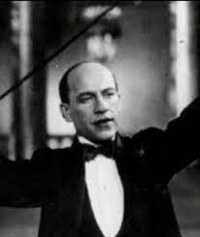
Isaak Osipovich Dunayevsky (Russian: Исаак Осипович Дунаевский listen (help·info); also transliterated as Dunaevski or Dunaevskiy; 30 January 1900 – 25 July 1955) was a Soviet film composer and conductor of the 1930s and 1940s, who composed music for operetta and film comedies, frequently working with the film director Grigori Aleksandrov.
Kenny Wheeler
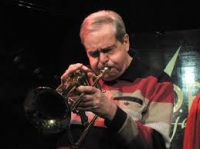
Kenneth Vincent John Wheeler, OC (14 January 1930 – 18 September 2014) was a Canadian composer and trumpet and flugelhorn player, based in the U.K. from the 1950s onwards.
Most of his performances were rooted in jazz, but he was also active in free improvisation and occasionally contributed to rock music recordings. Wheeler wrote over one hundred compositions and was a skilled arranger for small groups and large ensembles.
Wheeler was the patron of the Royal Academy Junior Jazz course
Most of his performances were rooted in jazz, but he was also active in free improvisation and occasionally contributed to rock music recordings. Wheeler wrote over one hundred compositions and was a skilled arranger for small groups and large ensembles.
Wheeler was the patron of the Royal Academy Junior Jazz course
Vico Torriani
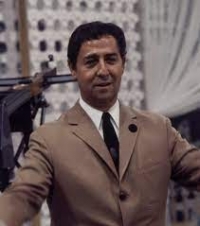
Vico Torriani (September 21, 1920 in Geneva as Ludovico Oxens Torriani – February 25, 1998 in Agno, Ticino) was a Swiss actor and Schlager singer.Born in Geneva to a family of Lombard origin, Torriani grew up in St. Moritz where he trained as a cook and pastry chef, already making appearances as a singer. He later opened a restaurant in Basel and wrote cookbooks. Having won a talent competition in 1945, he toured several West European countries and in 1949 entered the Swiss charts, followed by his breakthrough in West Germany in 1951. The next year he made his debut on Swiss television, later also on the German ARD broadcaster, where he hosted several TV shows with numerous guest stars
Jeremy Levy
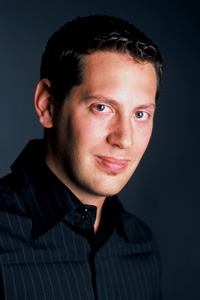
Composer/Arranger/Orchestrator, Jeremy Levy has worked in nearly every medium in Los Angeles. As an orchestrator, he adds his musical touch to scores in film, television, and video games. Recent projects include Minions, Revenge, Empire, The Book of Life, Batman: Arkham Knight, A Walk Among the Tombstones, Smurfs 2, Jack Reacher, Tower Heist, The Event, No Ordinary Family, Battlestar Gallactica, Infamous 2, and God of War 3. He has also provided arranging and music preparation services on everything from The Tonight Show with Jay Leno, to American Idol.
Jorge Ben

Jorge Duilio Lima Menezes (born March 22, 1939) is a Brazilian popular musician, performing under the stage name Jorge Ben Jor since the 1980s, though commonly known by his former stage name Jorge Ben (Portuguese: ). His characteristic style fuses samba, funk, rock and bossa nova with lyrics that blend humor and satire with often esoteric subject matter. His hits include "Chove Chuva", "Mas Que Nada", "Ive Brussel" and "Balança Pema", and have been interpreted by artists such as Caetano Veloso, Sérgio Mendes, Miriam Makeba, Soulfly and Marisa Monte.
Hair
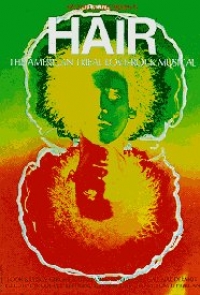
Hair: The American Tribal Love-Rock Musical is a rock musical with a book and lyrics by James Rado and Gerome Ragni and music by Galt MacDermot. A product of the hippie counter-culture and sexual revolution of the 1960s, several of its songs became anthems of the anti-Vietnam War peace movement. The musical's profanity, its depiction of the use of illegal drugs, its treatment of sexuality, its irreverence for the American flag, and its nude scene caused much comment and controversy. The musical broke new ground in musical theatre by defining the genre of the "rock musical", utilizing a racially-integrated cast and inviting the audience onstage for a "Be-in" finale.
Hair tells the story of the "tribe", a group of politically active, long-haired "Hippies of the Age of Aquarius" fighting against conscription to the Vietnam War and living a bohemian life together in New York City. They struggle to balance their young lives, loves and the sexual revolution with their pacifist rebellion against the war and the conservative impulses of their parents and society. Claude, one of the leaders of the tribe, must decide whether or not to resist the draft, as his friends have done.
After an off-Broadway debut in October 1967 at Joseph Papp's Public Theater and another run in a midtown discothèque space, the show opened on Broadway in April 1968 and ran for 1,750 performances, followed by a successful London production, which ran for 1,997 performances. Numerous productions have been staged around the world since then, and numerous recordings of the musical have been released. Several of the songs from its score became Top 40 hits, and a successful movie adaptation was released in 1979.
Hair tells the story of the "tribe", a group of politically active, long-haired "Hippies of the Age of Aquarius" fighting against conscription to the Vietnam War and living a bohemian life together in New York City. They struggle to balance their young lives, loves and the sexual revolution with their pacifist rebellion against the war and the conservative impulses of their parents and society. Claude, one of the leaders of the tribe, must decide whether or not to resist the draft, as his friends have done.
After an off-Broadway debut in October 1967 at Joseph Papp's Public Theater and another run in a midtown discothèque space, the show opened on Broadway in April 1968 and ran for 1,750 performances, followed by a successful London production, which ran for 1,997 performances. Numerous productions have been staged around the world since then, and numerous recordings of the musical have been released. Several of the songs from its score became Top 40 hits, and a successful movie adaptation was released in 1979.
Ryan George
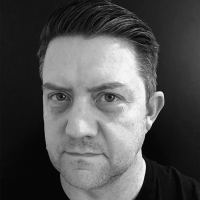
Ryan George currently resides in Austin, Texas where he is active as an arranger and composer. His work, ranging from music for the concert stage to music ...
The Beatles

The Beatles were a pop and rock group from Liverpool, England formed in 1960. Primarily consisting of John Lennon (rhythm guitar, vocals), Paul McCartney (bass guitar, vocals), George Harrison (lead guitar, vocals) and Ringo Starr (drums, vocals) throughout their career, The Beatles are recognised for leading the mid-1960s musical "British Invasion" into the United States. Although their initial musical style was rooted in 1950s rock and roll and homegrown skiffle, the group explored genres ranging from Tin Pan Alley to psychedelic rock. Their clothes, styles, and statements made them trend-setters, while their growing social awareness saw their influence extend into the social and cultural revolutions of the 1960s. After the band broke up in 1970, all four members embarked upon solo careers.
The Beatles are one of the most commercially successful and critically acclaimed bands in the history of popular music, selling over a billion records internationally. In the United Kingdom, The Beatles released more than 40 different singles, albums, and EPs that reached number one, earning more number one albums (15) than any other group in UK chart history. This commercial success was repeated in many other countries; their record company, EMI, estimated that by 1985 they had sold over one billion records worldwide. According to the Recording Industry Association of America, The Beatles have sold more albums in the United States than any other band. In 2004, Rolling Stone magazine ranked The Beatles number one on its list of 100 Greatest Artists of All Time. According to that same magazine, The Beatles' innovative music and cultural impact helped define the 1960s, and their influence on pop culture is still evident today. In 2008, Billboard magazine released a list of top-selling Hot 100 artists to celebrate the chart's fiftieth anniversary; The Beatles reached #1 again.
The Beatles are one of the most commercially successful and critically acclaimed bands in the history of popular music, selling over a billion records internationally. In the United Kingdom, The Beatles released more than 40 different singles, albums, and EPs that reached number one, earning more number one albums (15) than any other group in UK chart history. This commercial success was repeated in many other countries; their record company, EMI, estimated that by 1985 they had sold over one billion records worldwide. According to the Recording Industry Association of America, The Beatles have sold more albums in the United States than any other band. In 2004, Rolling Stone magazine ranked The Beatles number one on its list of 100 Greatest Artists of All Time. According to that same magazine, The Beatles' innovative music and cultural impact helped define the 1960s, and their influence on pop culture is still evident today. In 2008, Billboard magazine released a list of top-selling Hot 100 artists to celebrate the chart's fiftieth anniversary; The Beatles reached #1 again.
Marvin Hamlisch
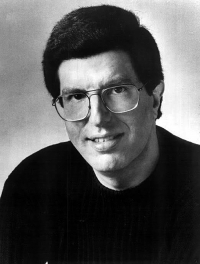
Marvin Frederick Hamlisch (June 2, 1944 – August 6, 2012) was an American composer and conductor. Hamlisch was one of only sixteen people to win Emmy, Grammy, Oscar and Tony awards. This collection of all four is referred to as an "EGOT". He is one of only two people (along with composer Richard Rodgers) to have won those four prizes and a Pulitzer Prize ("PEGOT").
Shontelle

Shontelle Layne, better known by her mononym Shontelle, is a Barbadian singer. She released her debut album Shontelligence in November 2008. Her second album, No Gravity, was released in September 2010. Her singles, "T-Shirt", and "Impossible", achieved international success.
max steiner
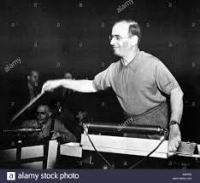
Maximilian Raoul Steiner (May 10, 1888 – December 28, 1971) was an Austrian-born American music composer for theatre and films, as well as a conductor. He was a child prodigy who conducted his first operetta when he was twelve and became a full-time professional, either composing, arranging, or conducting, when he was fifteen.
Steiner worked in England, then Broadway, and in 1929 he moved to Hollywood, where he became one of the first composers to write music scores for films. He is referred to as "the father of film music", as Steiner played a major part in creating the tradition of writing music for films, along with composers Dimitri Tiomkin, Franz Waxman, Erich Wolfgang Korngold, Alfred Newman, Bernard Herrmann, and Miklós Rózsa.
Steiner worked in England, then Broadway, and in 1929 he moved to Hollywood, where he became one of the first composers to write music scores for films. He is referred to as "the father of film music", as Steiner played a major part in creating the tradition of writing music for films, along with composers Dimitri Tiomkin, Franz Waxman, Erich Wolfgang Korngold, Alfred Newman, Bernard Herrmann, and Miklós Rózsa.
Richie Kotzen
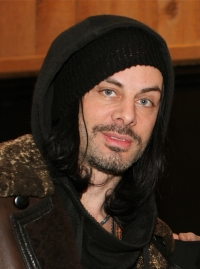
Richard Dale Kotzen Jr. (born February 3, 1970) is an American guitarist, singer, songwriter, multi-instrumentalist and producer. As a solo artist, Kotzen has back catalogue of more than 20 album releases. He was a member of glam metal band Poison from 1991 to 1993, Mr. Big from 1999 to 2002, and since 2012, has been the frontman of the band The Winery Dogs. Kotzen was signed to California-based Shrapnel Records from 1988 to 1991, and again from 1995 to 1997.
John Mackey
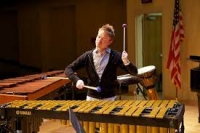
John Mackey (born October 1, 1973) is an American composer of contemporary classical music, with an emphasis on music for wind band, as well as orchestra. For several years, he focused on music for modern dance and ballet.John Mackey was born in New Philadelphia, Ohio and grew up in Westerville, Ohio, where he attended Westerville South High School. Though musicians themselves, Mackey's parents did not provide him with music lessons, and he never formally studied an instrument. His grandfather, however, taught him to read music and introduced him to digital music notation.
Music theory

Music theory is the study of the practices and possibilities of music. The Oxford Companion to Music describes three interrelated uses of the term "music theory"
Yves Montand
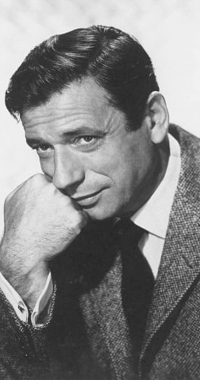
Ivo Livi (Italian pronunciation: ), better known as Yves Montand (French: ; 13 October 1921 – 9 November 1991), was an Italian-French actor and singer.Montand was born Ivo Livi in Monsummano Terme, Italy, to Giovanni Livi, a broom manufacturer, and Giuseppina Simoni, a devout Catholic, while her husband held strong Communist beliefs. Montand's family left for France in 1923 because of Italy's Fascist regime. He grew up in Marseille, where, as a young man, he worked in his sister's beauty salon (Salon de Coiffure), and later on the docks. He began a career in show business as a music-hall singer. In 1944, he was discovered by Édith Piaf in Paris and she made him part of her act.
Weather Report
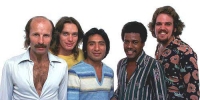
Weather Report was an American jazz fusion band of the 1970s and early 1980s. The band was initially co-led by the Austrian-born keyboard player Joe Zawinul, the American saxophonist Wayne Shorter and Czech bassist Jaco Pastorius
W.R Supratman

Wage Rudolf Soepratman was an Indonesian songwriter who wrote both the lyrics and melody of the national anthem of Indonesia – "Indonesia Raya". He is an Indonesian National Hero.
north royalton community band

The North Royalton Community Band was founded in 1998 and has grown to become a
well-rounded concert organization within a very short time. NRCB performs four to five scheduled concerts each year along with other special event concerts, playing a wide variety of music from marches to overtures, Broadway to Hollywood, classics to contemporary. All of our concerts are free and open to the public.
well-rounded concert organization within a very short time. NRCB performs four to five scheduled concerts each year along with other special event concerts, playing a wide variety of music from marches to overtures, Broadway to Hollywood, classics to contemporary. All of our concerts are free and open to the public.
Stevie Wonder

Stevie Wonder (born Stevland Hardaway Judkins on May 13, 1950, name later changed to Stevland Hardaway Morris) is an American singer-songwriter, multi-instrumentalist, and record producer. A prominent figure in popular music during the latter half of the 20th century , Wonder has recorded more than thirty top ten hits, won 26 Grammy Awards (a record for a solo artist), plus one for lifetime achievement, won an Academy Award for Best Song and been inducted into both the Rock and Roll and Songwriters halls of fame. He has also been awarded the Polar Music Prize.
Blind from infancy, Wonder signed with Motown Records as a pre-adolescent at age twelve, and continues to perform and record for the label to this day. He has nine U.S. number-one hits to his name (on the pop Charts, 20 U.S. R&B number one hits), and album sales totaling more than 150 million units. Wonder has recorded several critically acclaimed albums and hit singles, and writes and produces songs for many of his label mates and outside artists as well. Wonder plays the piano, synthesizer, harmonica, congas, drums, bongos, organ, melodica, and clavinet. In his early career, he was best known for his harmonica work, but today he is better known for his keyboard skills and vocals.
Blind from infancy, Wonder signed with Motown Records as a pre-adolescent at age twelve, and continues to perform and record for the label to this day. He has nine U.S. number-one hits to his name (on the pop Charts, 20 U.S. R&B number one hits), and album sales totaling more than 150 million units. Wonder has recorded several critically acclaimed albums and hit singles, and writes and produces songs for many of his label mates and outside artists as well. Wonder plays the piano, synthesizer, harmonica, congas, drums, bongos, organ, melodica, and clavinet. In his early career, he was best known for his harmonica work, but today he is better known for his keyboard skills and vocals.
Jazz Standard
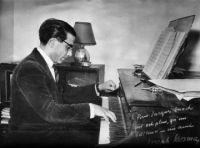
Autumn Leaves" is a popular song and jazz standard composed by Joseph Kosma with original lyrics by Jacques Prévert in French, and later by Johnny Mercer in English. An instrumental version by pianist Roger Williams was a #1 best-seller in the USA Billboard charts of 1955.
Thad Jones
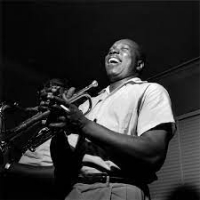
Thaddeus Joseph Jones was an American jazz trumpeter, composer, and bandleader who has been called "one of the all-time greatest jazz trumpet soloists".
Brahms

Johannes Brahms (May 7, 1833 â April 3, 1897) was a German composer of the Romantic period. He was born in Hamburg and in his later years he settled in Vienna, Austria.
Brahms maintained a Classical sense of form and order in his works â in contrast to the opulence of the music of many of his contemporaries. Thus many admirers (though not necessarily Brahms himself) saw him as the champion of traditional forms and "pure music," as opposed to the New German embrace of program music.
Brahms venerated Beethoven: in the composer's home, a marble bust of Beethoven looked down on the spot where he composed, and some passages in his works are reminiscent of Beethoven's style. The main theme of the finale of Brahms's First Symphony is reminiscent of the main theme of the finale of Beethoven's Ninth, and when this resemblance was pointed out to Brahms he replied that any ass â jeder Esel â could see that.
Ein deutsches Requiem was partially inspired by his mother's death in 1865, but also incorporates material from a Symphony he started in 1854, but abandoned following Schumann's suicide attempt. He once wrote that the Requiem "belonged to Schumann". The first movement of this abandoned Symphony was re-worked as the first movement of the First Piano Concerto.
Brahms also loved the Classical composers Mozart and Haydn. He collected first editions and autographs of their works, and edited performing editions. He also studied the music of pre-classical composers, including Giovanni Gabrieli, Johann Adolph Hasse, Heinrich Schütz and especially Johann Sebastian Bach. His friends included leading musicologists, and with Friedrich Chrysander he edited an edition of the works of François Couperin. He looked to older music for inspiration in the arts of strict counterpoint; the themes of some of his works are modelled on Baroque sources, such as Bach's The Art of Fugue in the fugal finale of Cello Sonata No. 1, or the same composer's Cantata No. 150 in the passacaglia theme of the Fourth Symphony's finale.
Brahms maintained a Classical sense of form and order in his works â in contrast to the opulence of the music of many of his contemporaries. Thus many admirers (though not necessarily Brahms himself) saw him as the champion of traditional forms and "pure music," as opposed to the New German embrace of program music.
Brahms venerated Beethoven: in the composer's home, a marble bust of Beethoven looked down on the spot where he composed, and some passages in his works are reminiscent of Beethoven's style. The main theme of the finale of Brahms's First Symphony is reminiscent of the main theme of the finale of Beethoven's Ninth, and when this resemblance was pointed out to Brahms he replied that any ass â jeder Esel â could see that.
Ein deutsches Requiem was partially inspired by his mother's death in 1865, but also incorporates material from a Symphony he started in 1854, but abandoned following Schumann's suicide attempt. He once wrote that the Requiem "belonged to Schumann". The first movement of this abandoned Symphony was re-worked as the first movement of the First Piano Concerto.
Brahms also loved the Classical composers Mozart and Haydn. He collected first editions and autographs of their works, and edited performing editions. He also studied the music of pre-classical composers, including Giovanni Gabrieli, Johann Adolph Hasse, Heinrich Schütz and especially Johann Sebastian Bach. His friends included leading musicologists, and with Friedrich Chrysander he edited an edition of the works of François Couperin. He looked to older music for inspiration in the arts of strict counterpoint; the themes of some of his works are modelled on Baroque sources, such as Bach's The Art of Fugue in the fugal finale of Cello Sonata No. 1, or the same composer's Cantata No. 150 in the passacaglia theme of the Fourth Symphony's finale.
Rage Against the Machine

Rage Against the Machine (often abbreviated as RATM and shortened to simply Rage) is an American rock band from Los Angeles, California. Formed in 1991, the group consists of vocalist Zack de la Rocha, bassist and backing vocalist Tim Commerford, guitarist Tom Morello, and drummer Brad Wilk. Their songs express revolutionary political views.
Miles Davis

Miles Dewey Davis III (May 26, 1926 – September 28, 1991) was an American trumpeter, bandleader, and composer.
Widely considered one of the most influential musicians of the 20th century, Miles Davis was, with his musical groups, at the forefront of several major developments in jazz music, including bebop, cool jazz, hard bop, modal jazz, and jazz fusion. Many well-known musicians rose to prominence as members of Davis' ensembles, including saxophonists Gerry Mulligan, John Coltrane, Cannonball Adderley, George Coleman, Wayne Shorter, Dave Liebman, Branford Marsalis and Kenny Garrett; trombonist J. J. Johnson; pianists Horace Silver, Red Garland, Wynton Kelly, Bill Evans, Herbie Hancock, Joe Zawinul, Chick Corea, and Keith Jarrett; guitarists John McLaughlin, Pete Cosey, John Scofield and Mike Stern; bassists Paul Chambers, Ron Carter, Dave Holland, Marcus Miller and Darryl Jones ; and drummers Philly Joe Jones, Jimmy Cobb, Tony Williams, Billy Cobham, Jack DeJohnette, and Al Foster.
On October 7, 2008, his album Kind of Blue, released in 1959, received its fourth platinum certification from the RIAA, signifying sales of 4 million copies. Miles Davis was inducted into the Rock and Roll Hall of Fame in 2006. Davis was noted as "one of the key figures in the history of jazz".
On November 5, 2009, Rep. John Conyers of Michigan sponsored a measure in the US House of Representatives to recognize and commemorate the album Kind of Blue on its 50th anniversary. The measure also affirms jazz as a national treasure and "encourages the United States government to preserve and advance the art form of jazz music." It passed, unanimously, with a vote of 409–0 on December 15, 2009.
Widely considered one of the most influential musicians of the 20th century, Miles Davis was, with his musical groups, at the forefront of several major developments in jazz music, including bebop, cool jazz, hard bop, modal jazz, and jazz fusion. Many well-known musicians rose to prominence as members of Davis' ensembles, including saxophonists Gerry Mulligan, John Coltrane, Cannonball Adderley, George Coleman, Wayne Shorter, Dave Liebman, Branford Marsalis and Kenny Garrett; trombonist J. J. Johnson; pianists Horace Silver, Red Garland, Wynton Kelly, Bill Evans, Herbie Hancock, Joe Zawinul, Chick Corea, and Keith Jarrett; guitarists John McLaughlin, Pete Cosey, John Scofield and Mike Stern; bassists Paul Chambers, Ron Carter, Dave Holland, Marcus Miller and Darryl Jones ; and drummers Philly Joe Jones, Jimmy Cobb, Tony Williams, Billy Cobham, Jack DeJohnette, and Al Foster.
On October 7, 2008, his album Kind of Blue, released in 1959, received its fourth platinum certification from the RIAA, signifying sales of 4 million copies. Miles Davis was inducted into the Rock and Roll Hall of Fame in 2006. Davis was noted as "one of the key figures in the history of jazz".
On November 5, 2009, Rep. John Conyers of Michigan sponsored a measure in the US House of Representatives to recognize and commemorate the album Kind of Blue on its 50th anniversary. The measure also affirms jazz as a national treasure and "encourages the United States government to preserve and advance the art form of jazz music." It passed, unanimously, with a vote of 409–0 on December 15, 2009.
Walt disney
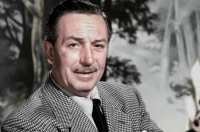
Walter Elias Disney (/ˈdɪzni/; December 5, 1901 – December 15, 1966) was an American entrepreneur, animator, voice actor and film producer. A pioneer of the American animation industry, he introduced several developments in the production of cartoons. As a film producer, Disney holds the record for most Academy Awards earned by an individual, having won 22 Oscars from 59 nominations. He was presented with two Golden Globe Special Achievement Awards and an Emmy Award, among other honors. Several of his films are included in the National Film Registry by the Library of Congress.
Count Basie
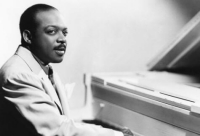
Count Basie Jazz pianist William "Count" Basie is an American jazz pianist, organist and jazz orchestra conductor.
Date of birth: August 21, 1904, Red Bank, New Jersey, USA Date and place of death: April 26, 1984, Hollywood, Florida, USA Instrument: Piano; Organ
Date of birth: August 21, 1904, Red Bank, New Jersey, USA Date and place of death: April 26, 1984, Hollywood, Florida, USA Instrument: Piano; Organ
Bill conti
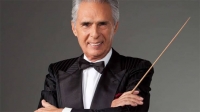
Bill William Conti is an American composer and conductor, best known for his film scores, including Rocky, Karate Kid, For Your Eyes Only, Dynasty, and The Right Stuff, which earned him an Academy Award for Best Original Score.
ABBA

ABBA was a Swedish Eurovision Song Contest-winning pop music group active between 1972 and 1982. Benny Andersson, Björn Ulvaeus, Anni-Frid Lyngstad (Frida), Agnetha Fältskog are in ABBA. They topped the charts worldwide from the mid-1970s to the early 1980s. The name "ABBA" is an acronym formed from the first letters of each of the group member's given name (Agnetha, Björn, Benny, Anni-Frid).
ABBA gained immense international popularity employing catchy song hooks, simple lyrics, and a Wall of Sound achieved by overdubbing the female singers' voices in multiple harmonies. As their popularity grew, they were sought-after to tour Europe, Australia, and North America, drawing crowds of near-hysterical fans ("ABBAholics"), notably in Australia. Touring became a contentious issue, being particularly unpopular with Agnetha, but they continued to release studio albums to great commercial success. At the height of their popularity, however, both marriages of the band members (Benny with Frida, and Björn with Agnetha) failed, and the relationship changes were reflected in their music, as they produced more thoughtful lyrics with different compositions.
They remain a fixture of radio playlists and are one of the world's best selling bands, having sold around 400 million records world wide; The music of ABBA has been re-arranged into the successful musical Mamma Mia! that has toured worldwide and a movie version was released in July 2008. All four of the former members of ABBA were present at the Stockholm premieres of both the musical (2005) and the film (2008). The film première took place at the Benny Andersson-owned Rival theatre at Mariatorget, Stockholm on 4 July 2008.
ABBA gained immense international popularity employing catchy song hooks, simple lyrics, and a Wall of Sound achieved by overdubbing the female singers' voices in multiple harmonies. As their popularity grew, they were sought-after to tour Europe, Australia, and North America, drawing crowds of near-hysterical fans ("ABBAholics"), notably in Australia. Touring became a contentious issue, being particularly unpopular with Agnetha, but they continued to release studio albums to great commercial success. At the height of their popularity, however, both marriages of the band members (Benny with Frida, and Björn with Agnetha) failed, and the relationship changes were reflected in their music, as they produced more thoughtful lyrics with different compositions.
They remain a fixture of radio playlists and are one of the world's best selling bands, having sold around 400 million records world wide; The music of ABBA has been re-arranged into the successful musical Mamma Mia! that has toured worldwide and a movie version was released in July 2008. All four of the former members of ABBA were present at the Stockholm premieres of both the musical (2005) and the film (2008). The film première took place at the Benny Andersson-owned Rival theatre at Mariatorget, Stockholm on 4 July 2008.
Beethoven

Ludwig van Beethoven (16 December 1770 - 26 March 1827) was a German composer and pianist. He was a crucial figure in the transitional period between the Classical and Romantic eras in Western classical music, and remains one of the most respected and influential composers of all time.
Born in Bonn, then in the Electorate of Cologne (now in modern-day Germany), he moved to Vienna in his early twenties and settled there, studying with Joseph Haydn and quickly gaining a reputation as a virtuoso pianist. Beethoven's hearing gradually deteriorated beginning in his twenties, yet he continued to compose masterpieces, and to conduct and perform, even after he was completely deaf.
Born in Bonn, then in the Electorate of Cologne (now in modern-day Germany), he moved to Vienna in his early twenties and settled there, studying with Joseph Haydn and quickly gaining a reputation as a virtuoso pianist. Beethoven's hearing gradually deteriorated beginning in his twenties, yet he continued to compose masterpieces, and to conduct and perform, even after he was completely deaf.
Bach

Johann Sebastian Bach (31 March 1685 – 28 July 1750) was a German composer and organist whose sacred and secular works for choir, orchestra, and solo instruments drew together the strands of the Baroque period and brought it to its ultimate maturity. Although he introduced no new forms, he enriched the prevailing German style with a robust contrapuntal technique, an unrivalled control of harmonic and motivic organisation in composition for diverse musical forces, and the adaptation of rhythms and textures from abroad, particularly Italy and France.
Revered for their intellectual depth and technical and artistic beauty, Bach's works include the Brandenburg concertos; the Goldberg Variations; the English Suites, French Suites, Partitas, and Well-Tempered Clavier; the Mass in B Minor; the St. Matthew Passion; the St. John Passion; The Musical Offering; The Art of Fugue; the Sonatas and Partitas for violin solo; the Cello Suites; more than 200 surviving cantatas; and a similar number of organ works, including the celebrated Toccata and Fugue in D Minor.
While Bach's fame as an organist was great during his lifetime, he was not particularly well-known as a composer. His adherence to Baroque forms and contrapuntal style was considered "old-fashioned" by his contemporaries, especially late in his career when the musical fashion tended towards Rococo and later Classical styles. A revival of interest and performances of his music began early in the 19th century, and he is now widely considered to be one of the greatest composers in the Western tradition.
Revered for their intellectual depth and technical and artistic beauty, Bach's works include the Brandenburg concertos; the Goldberg Variations; the English Suites, French Suites, Partitas, and Well-Tempered Clavier; the Mass in B Minor; the St. Matthew Passion; the St. John Passion; The Musical Offering; The Art of Fugue; the Sonatas and Partitas for violin solo; the Cello Suites; more than 200 surviving cantatas; and a similar number of organ works, including the celebrated Toccata and Fugue in D Minor.
While Bach's fame as an organist was great during his lifetime, he was not particularly well-known as a composer. His adherence to Baroque forms and contrapuntal style was considered "old-fashioned" by his contemporaries, especially late in his career when the musical fashion tended towards Rococo and later Classical styles. A revival of interest and performances of his music began early in the 19th century, and he is now widely considered to be one of the greatest composers in the Western tradition.
Tchaikovsky

Pyotr Il'yich Tchaikovsky (May 7 1840 â November 6 1893) was a Russian composer of the Romantic era. While not part of the nationalistic music group known as "The Five", Tchaikovsky wrote music which, in the opinion of Harold Schonberg, was distinctly Russian: plangent, introspective, with modally-inflected melody and harmony.
Aesthetically, Tchaikovsky remained open to all aspects of Saint Petersburg musical life. He was impressed by Serov and Balakirev as well as the classical values upheld by the conservatory. Both the progressive and conservative camps in Russian music at the time attempted to win him over. Tchaikovsky charted his compositional course between these two factions, retaining his individuality as a composer as well as his Russian identity. In this he was influenced by the ideals of his teacher Nikolai Rubinstein and Nikolai's brother Anton.
Tchaikovsky's musical cosmopolitanism led him to be favored by many Russian music-lovers over the "Russian" harmonies and styles of Mussorgsky, Borodin and Rimsky-Korsakov.
Nonetheless he frequently adapted Russian traditional melodies and dance forms in his music, which enhanced his success in his home country. The success in St. Petersburg at the premiere of his Third Orchestral Suite may have been due in large part to his concluding the work with a polonaise. He also used a polonaise for the final movement of his Third Symphony.
Aesthetically, Tchaikovsky remained open to all aspects of Saint Petersburg musical life. He was impressed by Serov and Balakirev as well as the classical values upheld by the conservatory. Both the progressive and conservative camps in Russian music at the time attempted to win him over. Tchaikovsky charted his compositional course between these two factions, retaining his individuality as a composer as well as his Russian identity. In this he was influenced by the ideals of his teacher Nikolai Rubinstein and Nikolai's brother Anton.
Tchaikovsky's musical cosmopolitanism led him to be favored by many Russian music-lovers over the "Russian" harmonies and styles of Mussorgsky, Borodin and Rimsky-Korsakov.
Nonetheless he frequently adapted Russian traditional melodies and dance forms in his music, which enhanced his success in his home country. The success in St. Petersburg at the premiere of his Third Orchestral Suite may have been due in large part to his concluding the work with a polonaise. He also used a polonaise for the final movement of his Third Symphony.
 Sheet Music Max is a site for those who wants to access popular sheet music easily,
letting them download the sheet music for free for trial purposes.
It's completely free to download and try the listed sheet music, but you have to delete the files after 24 hours of trial.
Don't forget, if you like the piece of music you have just learned playing,
treat the artist with respect, and go buy the original sheet music.
Sheet Music Max is a site for those who wants to access popular sheet music easily,
letting them download the sheet music for free for trial purposes.
It's completely free to download and try the listed sheet music, but you have to delete the files after 24 hours of trial.
Don't forget, if you like the piece of music you have just learned playing,
treat the artist with respect, and go buy the original sheet music.

